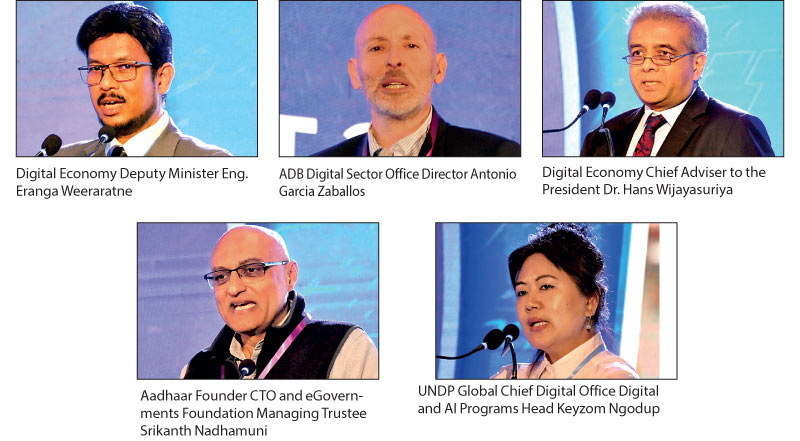Thursday Feb 19, 2026
Thursday Feb 19, 2026
Thursday, 6 February 2025 00:20 - - {{hitsCtrl.values.hits}}

By Janani Kandaramage
The Digital Economy Ministry, in partnership with the United Nations Develo-pment Programme (UNDP) in Sri Lanka, and the Asian Development Bank (ADB), kicked off the Sri Lanka Digital Public Infrastructure (DPI) Summit 2025 yesterday.
Spanning from 5-6 February in Colombo, the event gathers a wide range of technical and leadership expertise, creating a collaborative environment for knowledge exchange and a national platform for multi-sectoral partners to showcase their contributions in the DPI space.
A major highlight of the event will be the unveiling of the Government’s digital transformation vision for the country, in line with DPI adoption and acceleration.
Recognising the critical role of DPI as a catalyst for enhanced service delivery, transparency, and social inclusion, the summit is timely, given the recent adoption of the Global Digital Compact which highlights the DPI’s potential in driving innovation and immediate crisis management.
The Summit 2025 unites global leaders, academics, innovators, Government officials, and stakeholders from diverse sectors for dialogue and action on the existing limitations and opportunities around DPI to expedite economic growth while advancing Sustainable Development Goals (SDGs).
“It is worthwhile noting that for the Government, digital transformation is not just a 21st century trend that we are bound to follow – it represents a fundamental shift that could propel our economy to new heights. DPI is not just a buzzword – we understand its value and that it will serve as the backbone for any digital transformation efforts we embark on,” said Digital Economy Deputy Minister Eranga Weeraratne in his address at the inaugural.
“The Government envisions Sri Lanka’s digital economy reaching $ 15 billion by 2030. Our vision for a digital Sri Lanka is nothing if not ambitious, showing our unwavering commitment to leveraging technological advancements in the country.”
He also noted that the summit aims to stress the significance of public-private partnerships and cross-sector collaboration in successfully designing and implementing DPI at scale across the country, particularly with the necessary safeguards to anticipate and mitigate risk. He believes that by ensuring secure, reliable, and accessible data, the trust of users can be earned, which is key to driving a sustainable digital economy.
“Digital equity is central to our strategy. By establishing a relationship founded upon accountability via these universal safeguards, we will be able to encourage more individuals to utilise these digitalised systems for their daily needs. By eliminating this scepticism which is highly prevalent in Sri Lanka, we will be ensuring that all services are inclusive , equitable, and secure to all – particularly to rural and other marginalised communities,” the Deputy Minister added.
Aadhaar Founder CTO Srikanth Nadhamuni praised the local Government’s dedication to spearheading digitalisation across the economy, noting that it will steer the country towards its ‘Clean Sri Lanka’ objectives of ethical governance and zero poverty. Speaking about DPI and its impact in India, the Founder CTO said Aadhaar holds enrolled bank accounts with 1.3 billion people, out of which 754 million are enabled accounts.
He particularly stressed the growth of Unified Payments Interface (UPI) payments, with studies showing a 1% increase in UPI transactions within India, which he views as remarkable considering its vast populace.
Nevertheless, he acknowledged DPI’s pivotal role in social and financial inclusion, especially by enabling Small and Medium-sized Enterprises (SMEs) to compete effectively with larger corporations. The incorporation of multi-language support and simplified documentation further lowers operational costs, translating to reduced prices for consumers. This enhanced accessibility and affordability not only benefits businesses but also empower consumers, contributing to a more equitable and inclusive economy.
Supporting Nadhamuni’s assertion, Chief Adviser to President on Digital Economy Dr. Hans Wijayasuriya called the summit a landmark move towards bridging the digital divide, saying: “The Ministry is committed to building a robust digital economy that eliminates asymmetries across the socio-economic pyramid. This approach, through DPI, which serves as the foundation for all other digital services and initiatives, encompasses aspects such as secure and interoperable networks of components, including digital payments, identification, and data exchange systems, that deliver sustainable benefits to everyone.”
Highlighting the Governm-ent’s key objectives via digitalisation, Dr. Wijayasuriya spoke of strengthening efficiency of public services, integrating AI and robotics into industry processes, and uplifting digital exports to $ 5 billion. In addition, they aspire to leverage ICT professionals across all sectors, aligning with their overarching goal of expanding the digital workforce to over 200,000.
He also claimed that by reducing bureaucratic complexity via streamlined processes that alleviate the need for excessive documentation, the average transaction cost can be lowered below 1%. “This emphasis on affordability, availability, quality, and accessibility will ensure inclusivity to all communities,” he opined.
Over the two days, the summit will feature interactive panel discussions and workshops facilitated by Citra Lab, along with industry experts, Government representatives, and delegates that will focus on the various applications of DPI. These range from sectoral applications related to Tax and Revenue, Transport, and Tourism, to DPI for the Civil Registration and Vital Statistics (CRVS) and broader legal identity. With over 350 delegates in attendance, the two-day summit serves as a platform to foster collaboration, generate actionable insights, and steer the nation’s digital transformation agenda.
The DPI Summit is facilitated by Citra Lab, together with knowledge partners including the Centre for Digital Public Infrastructure (CDPI), Deloitte, and Vital Strategies. Industry partners include the Sri Lanka Association for Software and Services Companies (SLASSCOM), the Federation of Information Technology Industry Sri Lanka (FITIS), and the Computer Society of Sri Lanka (CSSL). Huawei joins as the strategic event partner, reflecting a broad collaboration to drive innovation and digital transformation.